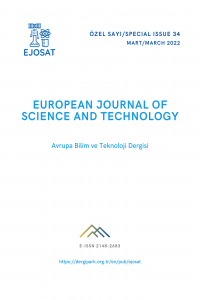The Polynomial Sequence Generalizing the Integer Sequence which Enumerates the Number of Subsets of the Set [n] Including No Two Consecutive Even Integers
Abstract
Fibonacci polynomial sequence is an extension of Fibonacci sequence. Here we define a polynomial sequence generalizing the integer sequence which enumerates the number of subsets of the set [n] including no two consecutive even integers. The polynomial sequence is associated with the Fibonacci polynomials. Some basic properties of the polynomial sequence are obtained.
Keywords
Fibonacci numbers Fibonacci polynomials Polynomial sequence Consecutive even integers Generating function Combinatorial representation
References
- Andrews, G.E. (2004). Fibonacci numbers and the Rogers-Ramanujan identities, Fibonacci Quarterly, 42(1), 3–19.
- Arslan B. (2016). Sequence A279312 in The On-Line Encyclopedia of Integer Sequences, published electronically at https://oeis.org.
- Falcon, S. and Plaza, A. (2009). On k-Fibonacci sequences and polynomials and their derivatives, Chaos Solitions and Fractals, 39, 1005-1019.
- Hoggatt, Jr. V.E., Bicknell, M. (1973). Generalized Fibonacci polynomials, Fibonacci Quarterly, 11(5), 457-465.
- Koshy, T. (2011). Fibonacci and Lucas Numbers with Applications, Wiley Interscience Publications, New York.
- Uslu, K. and Arslan B. (2021). The number of subsets of the set [n] containing no two consecutive even integers, JP Journal of Algebra Number Theory and Applications, 52(2), 243-254.
[n] Kümesinin Ardışık İki Çift Tamsayı İçermeyen Alt Kümelerinin Sayısını Veren Tamsayı Dizisini Genelleyen Polinom Dizisi
Abstract
Fibonacci polinom dizisi Fibonacci dizisinin bir genişlemesidir. Burada [n] kümesinin ardışık iki tamsayı içermeyen alt kümelerinin sayısını veren tamsayı dizisini genelleyen bir polinom dizisi tanımladık. Bu polinom dizisi Fibonacci polinomları ile ilişkilendirildi. Polinom dizisinin bazı temel özellikleri elde edildi.
Keywords
Fibonacci sayıları Fibonacci Polinomları Polinom dizisi Ardışık çift sayılar Üreteç fonksiyon Kombinatoryal gösterim
References
- Andrews, G.E. (2004). Fibonacci numbers and the Rogers-Ramanujan identities, Fibonacci Quarterly, 42(1), 3–19.
- Arslan B. (2016). Sequence A279312 in The On-Line Encyclopedia of Integer Sequences, published electronically at https://oeis.org.
- Falcon, S. and Plaza, A. (2009). On k-Fibonacci sequences and polynomials and their derivatives, Chaos Solitions and Fractals, 39, 1005-1019.
- Hoggatt, Jr. V.E., Bicknell, M. (1973). Generalized Fibonacci polynomials, Fibonacci Quarterly, 11(5), 457-465.
- Koshy, T. (2011). Fibonacci and Lucas Numbers with Applications, Wiley Interscience Publications, New York.
- Uslu, K. and Arslan B. (2021). The number of subsets of the set [n] containing no two consecutive even integers, JP Journal of Algebra Number Theory and Applications, 52(2), 243-254.
Details
| Primary Language | English |
|---|---|
| Subjects | Engineering |
| Journal Section | Articles |
| Authors | |
| Early Pub Date | January 30, 2022 |
| Publication Date | March 31, 2022 |
| Published in Issue | Year 2022 Issue: 34 |


